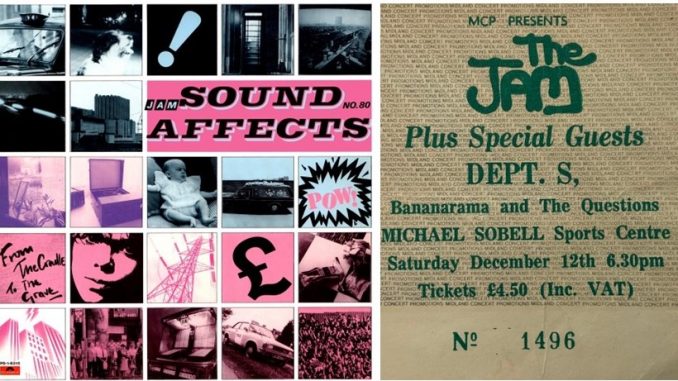
I was born in Bromley. The postal address of my parent’s house stated that we lived in “Bromley, Kent”. Pre-Brexit, rather than queues of lorries, Kent conjured up images of a rural idyll, with oast houses overlooking a green and pleasant land. However, Bromley is not actually in Kent, it’s located in south-east London, neither in the country or ‘In The City’. In the 1970s and 80s, when I was growing up, to my mind, Bromley was a cultural desert with an uninspiring town centre, surrounded by dull, middle class suburbia with almost nothing of any interest to recommend a visit.
Bromley hadn’t always been this way though. In the 1960s, the Bromel Club, a small venue located in the Bromley Court Hotel, attracted a surprisingly large number of big name acts on a regularly basis including Cream, Wilson Pickett, The Yardbirds, The Kinks, Prince Buster, Pink Floyd, The Who, The Spencer Davis Group, The Animals and Jimi Hendrix. In 1969, David Bowie was showcasing his talents most Sundays at The Three Tuns pub down the road in Beckenham High Street, where 13 years later my friends and I used to go underage drinking.
As a youngster music had passed me by, apart from the odd record by Petula Clark and Cliff Richard. At seven years old I remember being unimpressed by Mud, The Osmonds and The Sweet who regularly appeared on Top Of The Pops (TOTP). As New Wave hit in the late 1970s I was more enthralled with Abba’s ‘Voulez Vous’ than Elvis Costello’s ‘Armed Forces’. That was about to change. I first recall seeing The Jam playing ‘The Eton Rifles’ on TOTP in 1979 and then, in March 1980, ‘Going Underground’ went straight in at number one in the singles chart. It was talked about excitedly in the school playground. At the time it was the first instant chart-topper in more than six years and was only the ninth in total since the singles chart had been launched in 1952. It meant something.
‘Going Underground’ struck a chord with me, it spoke of the social issues of the time such as nuclear destruction, political corruption and the general apathy of people to change anything. A few months later I went up to the Virgin Megastore on Oxford Street and purchased ‘Sound Affects’. I bought the American import for £5.50, primarily because it came with a free 7” single featuring ‘Going Underground’ and ‘The Dreams Of Children’. The album’s artwork is a clever pastiche of the covers of the BBC ‘Sound Effects’ records. These were a series of LPs, beloved by amateur dramatic societies in the 1970s, which included tracks such as ‘Old Fashioned Door Bell’ and ‘Domestic Fire Burning’.
To this day I still think that ‘Sound Affects’ is Paul Weller’s best album. It’s heavily influenced by The Beatles’ ‘Revolver’. It was very good of George Harrison not to sue Weller for plagiarism. There really isn’t any difference between the guitar and bassline on ‘Start’ and the Quiet One’s ‘Taxman’. It’s a record that’s stood the test of time. Has the England that’s reflected upon in ‘That’s Entertainment’, ‘Man In The Corner Shop’ and ‘Pretty Green’ really changed that much since these songs were written over 40 years ago? It’s also got some quirky, angular experimental tracks such as ‘Music For The Last Couple’.
‘Sound Affects’ inspired me to venture to my first ever gig at the age of 15 at the Michael Sobell Sports Centre. On Saturday 12 December 1981 I found myself being chased around the snowy and icy streets of north London by fans of The Exploited, who were playing at the nearby Rainbow Theatre, before arriving at the venue where The Jam were playing the first of four benefit gigs for the Campaign for Nuclear Disarmament (CND). Technically The Jam weren’t the first band I ever saw live. First up it was a then unknown Bananarama who came on to sing three songs over a backing tape before being bottled off by the unappreciative Mods and Punks. We were also treated to sets by The Questions and Dept. S with a DJ spinning northern soul classics between their sets.
When The Jam came on the place went mad. Five thousand people pogoing in unison fuelled by nothing more than fizzy drinks. I haven’t been to many gigs since that were as intense as this one. This was one of the first times that The Jam had performed a gig with a brass section plus keyboards and it was definitely the public premier of ‘A Town Called Malice’. A further five songs from the band’s last studio album, ‘The Gift’, which wasn’t released until the following March, received their debuts, as well as a soulful rendition of Chairman Of The Board’s ‘Give Me Just A Little More Time’.
Weller’s consistently followed his own path. Love him or hate him, he’s always looking to the future. It was a good lesson to learn and it also convinced me that a life of “suburban bliss” in Bromley wasn’t for me. I remember being upset when Weller broke up the band at their zenith a year later; now I feel glad that he’ll never put them back together again, after all nostalgia shouldn’t be the opium of the people, should it?



Loved reading this! Brought back great memories, with The Jam at Bracknell Sports Centre in November ’78 being my first ever gig!
Glad you enjoyed the article Graham, it prompted me to go and listen to a recording of the 1981 Michael Sobell Centre gig. Even though it was held in a cavernous venue, The Jam and the brass section are incredibly tight. Great first gig for me to attend.
I went to the gig the next night, my first proper gig. Great times.